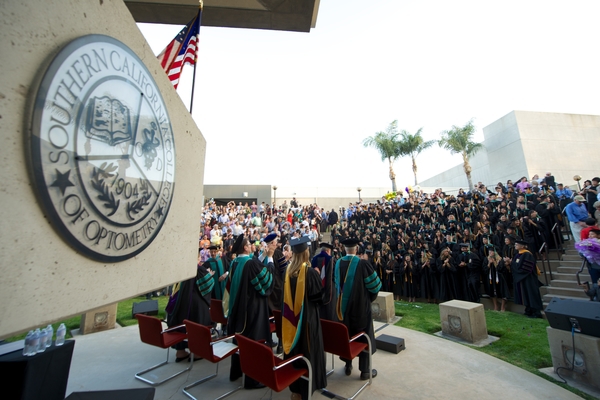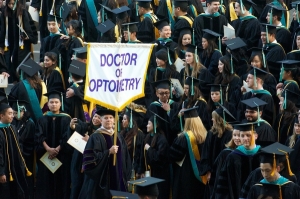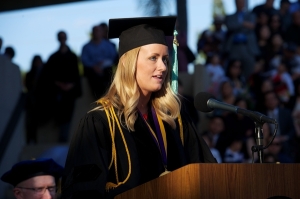
“Why consider an academic degree for optometry when the professional degree (OD) is considered the terminal degree? That is a great question. There are many reasons…”
Photo downloaded from iStock.com
As you prepare to interview, having a vision for how you want to practice optometry is key. Most applicants limit their perspective of optometry by considering it solely in its traditional clinical context, meaning they think of their future solely in terms of delivering patient care. This is a limited perspective—one that may limit your potential for your future!
As you embark on your own optometric education, and especially as you prepare to talk about your future in optometry within the context of the interview, consider an optometric academic degree in that plan.
The OD degree granted from traditional optometric education is a professional degree. There are also academic degrees offered as well. The academic degree offered here at MBKU is the Master of Science in Vision Science (MS). It may be completed concurrently with the OD degree.
Why an academic degree for optometry when the professional degree (OD) is considered the terminal degree? That is a great question. There are many reasons:
- Optometry’s popularity is on the rise. As a result and since 2006, five new optometry schools have been added to make a total of 21. This has created a demand for faculty in optometric academe. If you think you may want to teach, an academic degree in optometry gives you an advantage should a position as an optometric faculty member be your objective.
- Ophthalmic industry needs optometrists for both research and administration. Companies such as Bausch and Lomb, Vistakon, Essilor, all have optometrists in administrative positions. Having an academic degree provides an advantage in this arena. Should you have a gift for administration, being a CEO in ophthalmic industry would be a great way to serve the profession. More about these points in the article that follows.
- Don’t make the mistake of thinking that clinical optometry is the polar opposite of academic optometry. Should you wish to position yourself for greater marketability as a new graduate who wants to deliver patient care, whether you seek a position in private/group practice or a multidisciplinary setting (i.e. on staff at a hospital or in other clinical settings where groups of professionals work to serve a patient’s needs), having an academic degree will make you stand out.
I asked Dr. William Ridder, the Assistant Dean for Graduate Studies here at MBKU, to explain why a student on-track to obtain an OD degree might consider applying for the MS degree. Here is his response:
Why Should an Optometrist Get a Master’s Degree? by Dr. William Ridder, Professor, Assistant Dean for Graduate Studies at MBKU
This is a question that many students with a background in research and an interest in optometry ask themselves. How will an MS degree help me obtain my goals? What will I be able to do that I would not be able to do with the OD degree?
The Master of Science in Vision Science (MS) offered here at MBKU prepares you for a wide range of career choices. It gives you the skills needed to teach in an optometry school. These skills are not taught in optometry school or residency programs.
An MS degree can also give you the skills necessary to do clinical or basic research. This research can be in a wide range of settings: optometry or medical schools, industry, or a private office. Many optometrists with MS or PhD degrees practice in optometry schools. But the pharmaceutical and contact lens industries need optometrist trained in research.
Many of the current advances in the clinical practice of optometry are developed by optometrists working for companies. Industrial research is a rapidly expanding area for doctors of optometry. With an MS degree, you could also carry out research in your private office.
There are many optometrists that conduct clinical research in their private practice. These are often times multi-center clinical studies that are funded by industry. This may be to examine a new contact lens, solution, or drug.
There is a great need for new knowledge in the vision sciences, and teaching and research opportunities are numerous. If you have a background in research, and want to continue this as an optometrist, consider getting an MS degree.
In Conclusion:
The MS degree offered at MBKU may be completed concurrently with the OD degree. For more information about, visit our website and read about the MS degree program. Any questions, direct them to Dr. Ridder at wridder@ketchum.edu
You never know where your professional career will take you! As you plan your optometric education, be open-minded about options. Do your research by posing the various educational scenarios about degree programs and getting feedback from the doctors you plan to shadow. This will help you set the stage for an optometric career that will grow, expand, and serve you for a lifetime.
When it comes time to interview, the most important topic for discussion will be how you see your future as an optometrist. By having this additional perspective about the possibility of pursuing an academic degree and by consulting various optometry and educational mentors about this goal, you will have that much more of an edge as you discuss your plan for your own optometric education, which will add a vital element to your interview exchange.
Jane Ann Munroe,OD, Assistant Dean of Admissions, SCCO

“The Master of Science in Vision Science (MS) offered here at MBKU prepares you for a wide range of career choices.”
Categories: About Us, Applying, Dr. Munroe's Recommended Reading





1 reply »